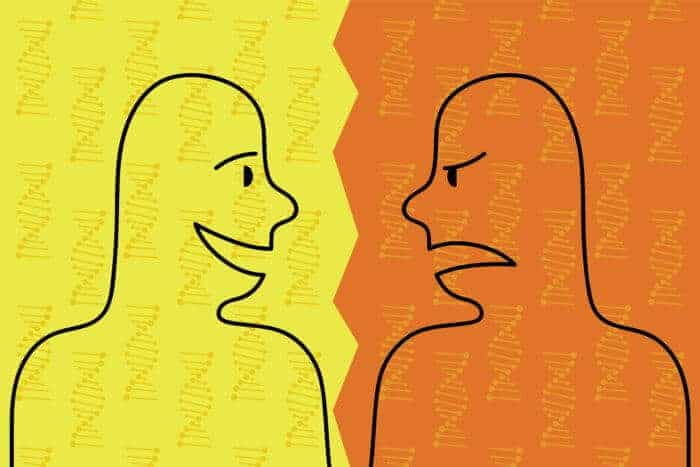Using artificial intelligence techniques, researchers studying the role of genes and the environment in shaping our personalities have identified gene networks largely responsible for the development of and variation in personality.
Those networks include 972 individual genes linked to aspects of personality, such as self-awareness, intentionality — which has to do with a person being deliberate or purposeful — and creative thinking relating to the purpose and meaning a person hopes to achieve. The findings also suggest that, regardless of genes and environmental factors, individuals still possess the capacity to make choices that also can influence personality and that those choices can result in personality changes over time.
The new research, led by a group at Washington University School of Medicine in St. Louis and the University of Granada, Spain, is published Nov. 21 in the journal Molecular Psychiatry.
“Personality is an individual’s unique pattern of behaviors, feelings and thoughts, and those factors are strong predictors of physical, mental and social health,” said the study’s senior investigator, C. Robert Cloninger, MD, a professor emeritus in psychiatry at Washington University. “A better understanding of how those factors work together could contribute to improvements in psychiatric and general health for people around the world.”

Using computer algorithms, they identified three distinct gene networks connected to personality. The networks are related to learning and memory, but the computer algorithms also found that most of the genes in the three personality networks are not only associated with brain activity but also function in many other organs. As a result, development of a healthy, well-integrated personality may influence a person’s physical health as well as his or her mental and social health and well-being, Cloninger said.
“In addition to genes, a person’s environment — which might include home life, family income level, education, exposure to violence or poverty, rural or urban life, and other factors — also influences personality,” he said. “Our personalities develop from the actions of both genetic and environmental factors, as well as interactions between genes, and between genes and environment. Although there are many combinations of genetic and environmental influences, as human beings we still have the capacity to freely choose some aspects of how our personalities develop.”
The researchers studied gene-environment relationships in more than 2,100 healthy people in Finland who were part of what’s called the Young Finns Study. The scientists then replicated those findings in people from other cultures and backgrounds, studying similar genetic data from more than 900 healthy adults in Germany and more than 1,000 adults in South Korea.
“We were able to replicate associations between genetic markers and personality traits in all three groups,” said co-investigator Igor Zwir, PhD, an assistant professor in psychiatry and an associate professor in computer science and artificial intelligence at the University of Granada, Spain. “In all three populations, we found the same associations between personality traits and genetic markers. However, in people within each country, the same gene networks didn’t always lead to the same personality traits.”

Even with the influence of genes and environmental factors, Cloninger noted that an individual’s free will also is involved in how his or her personality develops, as well as how it might change over time.
“For a long time, mental health professionals felt that personality traits were fixed early in life and that a person’s personality didn’t really change much, but we’ve found that personality can and does change and evolve,” he said. “Some gene networks influence habit learning, which is the gradual acquisition of associations between stimuli and responses that help us learn to make one choice rather than another. Others influence our capacity to set goals and accomplish them intentionally. But when we change our goals and intentions, or the things we value, we actually also modify the ways that these genes work to influence personality. In other words, our character allows us to regulate the way some of these genes function.”
The researchers divided personality into two parts: temperament, representing habits and automatic emotional reactions; and character, representing qualities such as cooperativeness, self-directedness and self-transcendence. The way a person develops his or her character shapes the ability to regulate desires and to satisfy goals and values.
Computer algorithms allowed the researchers to identify clusters of genes related to character that regulate temperament through pathways that involve learning. But in addition to their effects on the brain, those genes also may influence overall health and vulnerability to illness. It turned out the healthiest people were able to create healthy ways of living, using their self-awareness and insight.
The researchers also found that some of both temperament and character were passed on from one’s parents. About 50% of a person’s temperament and character were heritable. In addition, they found that what was inherited involved three distinct ways of learning that are crucial to being healthy and feeling satisfied with life.
“Nature and nurture cannot be separated,” Cloninger said. “We inherit how we learn, and that means we are then able to deliberately and creatively shape how we adapt to life’s challenges and opportunities.”
Added Zwir: “Although we inherit some of our personality, that still leaves a great deal of room for change. We are uncovering a dynamic system of relationships between gene networks and environmental factors. If you measure personality with our tools and then come back and do it again six months or a year later, you might see changes because personality seems to develop and evolve. Very little of this is fixed. It can be changed in both positive and negative ways.”


